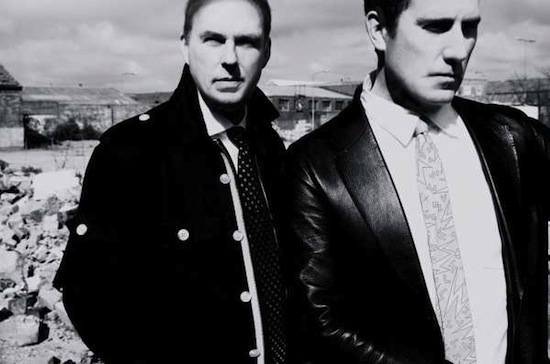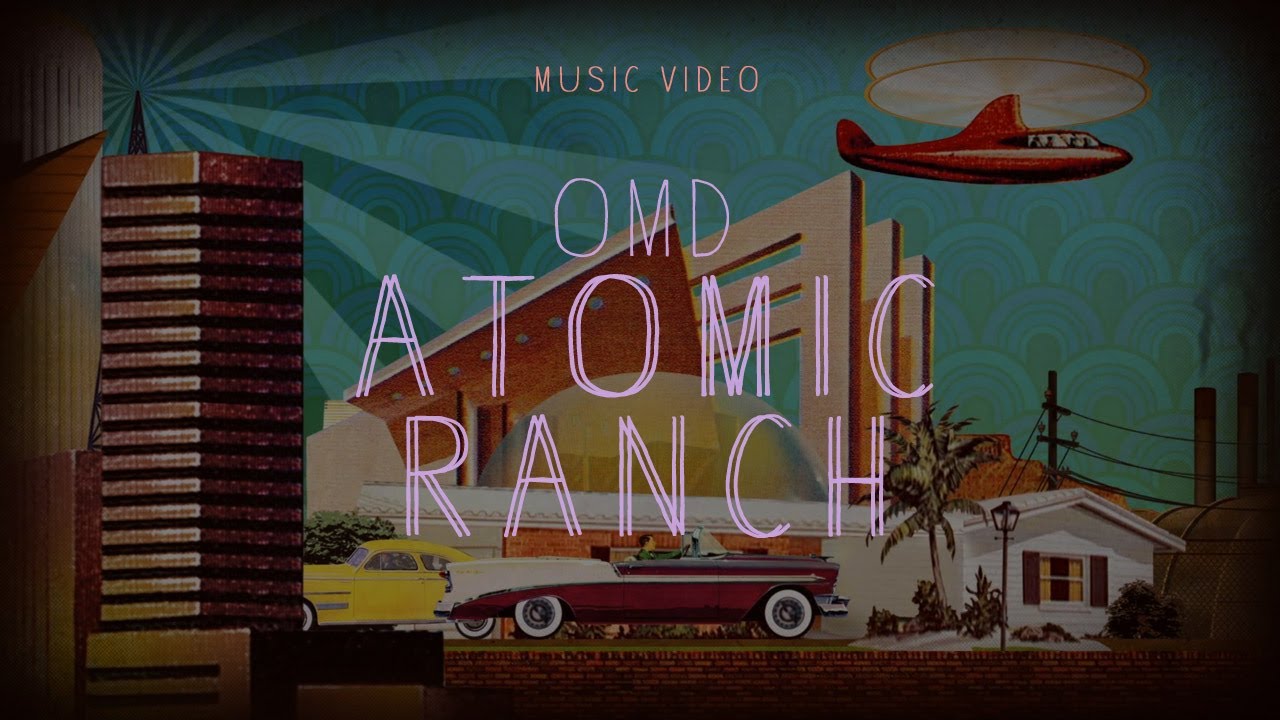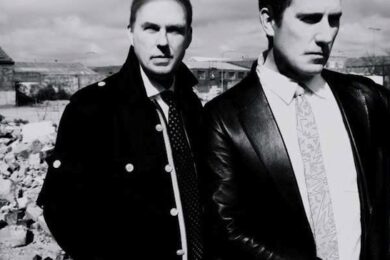Having already announced earlier this year that OMD are set to return on April 8 with their second album since their reunion, the band have launched another video for album track ‘Atomic Ranch’, following one released in January featuring the song ‘Decimal’. Both feature animation by German artist Henning M. Lederer – have a watch of the new video below:
Andy McCluskey has meanwhile been talking about English Electric, and in the first interview he’s done since its completion – for an in-depth feature in Classic Pop magazine, due for publication on April 4 – he explores the band’s history and their legacy. He also spent time discussing the making of the new album, and here he lays out his thoughts about the concepts that lie behind it and the always-complicated search for a balance between the band’s experimental and melodic tendencies.
Kraftwerk remain a strong influence on OMD. I think you’ve become friends with members of the band?
Andy McCluskey: I did a little bit of work with Karl Bartos, and in fact I’ve been emailing him backwards and forwards in the last few months. He’s got a new album out as well [Off The Record, set for release on March 18]. We’ve taken a song that I did with him twenty years ago [‘Kissing The Machine’] and reworked it and put it on this new album.
‘Metroland’ seems strongly reminiscent of Kraftwerk’s ‘Europe Endless’.
Indeed.
‘Decimal’ and ‘Kissing The Machine’ seem fairly indebted to Kraftwerk too. Sometimes I feel that when journalists say that something sounds like it owes a debt to another band, often what it means is that the band have just used the same technology rather than it being compositionally influenced. Do you think journalists are often quite lazy in that way?
AM: Well, I think so, especially when you get into niches. Listen, ‘Decimal’ has been released on the internet with a short video that we’ve had made for it, and the number of people who have actually said, "oh, OMD have recreated their own ‘Time Zones’ or their own ‘ABC Auto-Industry’ from Dazzle Ships", and other people are like "no, no, no, it’s still leaning on Kraftwerk: ‘News’ from the Radioactivity album." Nobody goes around saying "ah, The Clash were totally ripping off The Beatles because they had two guitars, bass and drums, and they sometimes used the words ‘I’ and ‘me’ and ‘it’ in songs." [LAUGHS]
I think some of the things we’ve done on the new album, which are not traditional songs, yeah, people will go "they’re copying themselves. You’re going back to…" Yes, we are leaning on things we’ve done in the past. But we’re not just copying it. ‘Decimal’ is a completely different idea to ‘Please Remain Seated’, but they both have computer voices. So does ‘Atomic Ranch’. Completely different piece of music. Completely different intellectual concept and lyrical idea.
Anyway, the interesting thing is – I’ll let you into a secret – the main influence on ‘Decimal’ is nothing to do with Kraftwerk, nor is it anything to do with Orchestral Manoeuvres In The Dark, and I cannot believe that no one actually spotted where ‘Decimal’ comes from. 1975, before Kraftwerk released the Radioactivity album, and before we’d ever released anything: Einstein On The Beach by Philip Glass. That’s the most obvious reference…
You produced both History Of Modern and this new record yourselves. How important is it that you’ve taken things into your own hands?
AM: For better and for worse, we always had a vision of what we were trying to achieve, and we knew what direction we wanted to go in. The bottom line is, we wanted to do it our own way. We produced our early records. There were other people called the producers, but in reality they were actually just the engineer. They just did our ideas and made them sound reasonable for the record. Had we had a proper producer they would have said "you can’t do that". Nobody tells us what we can and can’t do. We decide! (LAUGHS)
So over what period of time was this new record written?
AM: The difference between this and History Of Modern is that this hangs together holistically in terms of the timeframe. Apart from the complete reworking of ‘Kissing The Machine’, everything on this record has been written in the last two years. ‘Dresden’ and ‘Final Song’ came from pieces of music that I had from the year before, but I hadn’t got a lyric on. I got the lyric on them two years ago, in January 2011. So basically the whole album has been written within the immediate recent timeframe.
Where did you record?
AM: Mostly in the Motor Museum, which is my studio. But actually not in the main room: in my programming room. One of the differences on this is that Paul has fortunately been more involved, which was great. We tried in the past to send things up and down the internet, but we are much better when we work in the same room bouncing ideas of each another in each other’s presence. So Paul spent a lot of time coming up to Liverpool for a week, staying in my house, going to the studio. Some of it‘s been reworked down at Paul’s place in London, but basically it’s been done in our own two studios.
This is probably the most successful marrying of the experimental and pop directions that OMD have done for a long, long time. Were you trying to settle down and marry the different qualities that make the band what they are, or was this just instinctive?
AM: No, we were consciously trying to do that. History Of Modern was us showing that we could still write songs. This is the crazy thing: History Of Modern was a – I won’t use the word brilliant, I’ll sound immodest – History Of Modern was a very, very good collection of songs; extremely well written, melodic songs. That wasn’t enough. So Paul and I sat down and said "OK, we don’t want to be a nostalgic heritage act. Nor, however, is it sufficient for us to just write a nice collection of songs in the style of OMD." I remember I was sat at the kitchen table, Paul was standing by the sink, drinking a cup of coffee, and I said "What do we do next? We know we can write songs. We’ve proved we can do it. That’s not only what we do. What does the future sound like? And can we dare to dream that we could possibly reflect a little of it again?" And that became our mantra: "What does the future sound like?"
We have worked on this on the new album. We have touched on various things – we’ve listened to a lot of glitch music and stuff – but there’s only so much of recent trends that we can adapt and weld into our own music, because we’re not here to do musical experiments for the sake of musical experiments, because they don’t stand repeated listening. One thing we realised is that, even when we were experimental, we made listenable music. That was the tightrope that we walked. It was, for lack of a better word, experimental, interesting, conceptual, but it was sufficiently musical and melodic that it bore repeated listening.
So yes, we were consciously trying to ask questions about the world, ourselves, music, the future of music. One of the songs is called ‘The Future Will Be Silent’. We looked at how we had constructed some of our more unusual songs, and a lot of them were made from concrete music, found sounds, and we looked at what we had explored in the past and we were trying not to repeat ourselves, and, well, we’ve done trains; we’ve done machinery. And then I actually said to myself "I realise now that everything that we’ve sampled from the real world – trains, machines, computers, guns, typewriters – they were actually accidental". The audio that we had sampled was a waste product from the specific design function of whatever it was that we had recorded.
Let me clarify that: a typewriter is designed to type things onto a page, not make a clicking noise when you hit the key. A steam engine is not designed to go ‘chuff chuff’. That’s an audio waste product of the inefficiency of its engine. And as the world has modernised, the accidental audio by-products, waste products, of the things that have become concrete music are going to be less and less because the designers have designed out the waste so that the machinery of the modern world has actually become more silent. So ‘The Future Will Be Silent’ is actually a reference to that concept. That’s the sort of thing that OMD should be writing songs about. (LAUGHS)
Did you feel that you had something to prove with this record? Or was it a lack of that which gave you the freedom to make this record the way you have?
AM: We certainly had a freedom. One of the things we said to ourselves was "we don’t need to do this. We have a canon of music from the past which is sufficient. People say nice things about us now. We get royalties from the old tracks. We don’t have to top up our pension. So why are we doing this?" And we’re doing it because we’re still essentially going back to being teenagers and having a conversation with ourselves. This is Humphreys and McCluskey essentially relearning the language that they invented for themselves over thirty years ago, which we have a confidence in because we have spent the last five years playing live, and we’ve made another album, and we know that people will accept what we do if we do it to the very best of our abilities. There is a place for us.




